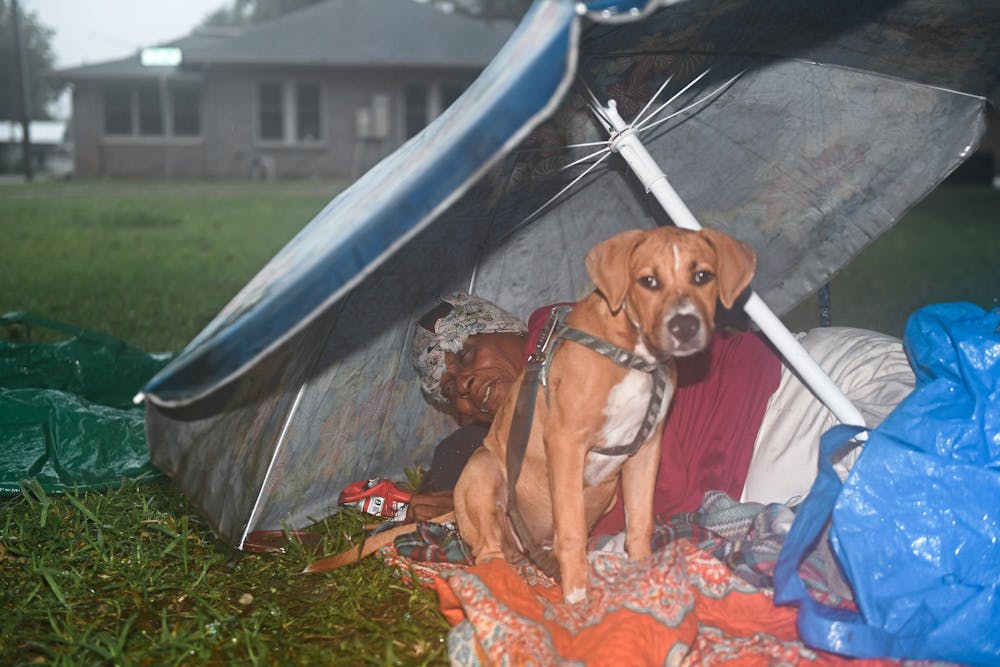The last week of September marked one year of homelessness for 36-year-old Lana Wise. She often struggles to find a private place to use the bathroom, sometimes going for more than 24 hours without relief.
Wise said she’s among 40 other homeless individuals that live off Southeast Fourth Place and around St. Francis House in downtown Gainesville.
Now, she said she struggles to come to terms with a new bill that went into effect Oct. 1 banning encampment on public streets and property like the ones Wise spends her days and nights at.
“If you don’t want us to sit on your sidewalk, and now all of a sudden it’s yours versus mine, where is it legal to?” she said through tears.
House Bill 1365, signed by Gov. Ron DeSantis on March 20, isn’t meant to eliminate homelessness, but instead ensure citizens feel safe and communities remain thriving, bill sponsor Rep. Sam Garrison (R-11) said.
“When you have situations when encampments pop up, business owners see decreased foot traffic,” he said. “It hollows out those communities for businesses, which has cascading collateral consequences. And as a result of that, you see parks being taken over and families don’t feel safe.”
Garrison said it took hours of debate and months of deliberation with city mayors to come up with the bill, which will allow Florida counties to enforce the provisions how they see fit.
Under the provisions, Florida counties can designate certain public places for encampment in a specific time period, to be approved by the Department of Children and Families.
After Jan. 1, if citizens or business owners witness unauthorized public encampment or sleeping, they can submit an affidavit to the city.
The city will then have five days to take reasonable action to remove those publicly sleeping or encamping, Garrison said. If they fail to do so, citizens or business owners can sue their local government.
The bill does not outline penalties for those sleeping and encamping on public property.
If counties do not have sufficient shelter space for those suffering from homelessness, the bill will push officials to make sure there are designated, safe and sanitary areas for public sleeping and encampment, he said.
To prepare for the influx of homeless individuals in shelters, the Florida government increased the current year’s budget by nearly 300% for emergency shelter space, Garrison said.
“I don’t know that this bill honestly changes anything about how the city of Gainesville responds to this issue [homelessness],” said Gainesville Mayor Harvey Ward.
Instead, Ward said problems from the new bill will lie within communities that do little to nothing to support its homeless population.
Gainesville does much more than little to nothing, he said.
The city focuses on sending resources and outreach teams to those in encampments, whether that be from the city or GRACE Marketplace, to support its “homeless sisters and brothers,” Ward said.
Along with resources, the Gainesville City Commission approved a budget including $2 million for GRACE Marketplace Sept. 30.
While Alachua County Commissioner Mary Alford said she’s concerned about the lack of affordable housing for homeless people, she said she’s more worried about the bill’s lack of solutions for the reasons why some people end up homeless.
“My biggest concern, quite frankly, is the fact that this bill doesn’t provide the resources that we need to deal with mental illness, which is often the root cause of many folks that are on the streets and unwilling to go to shelters,” she said.
Legislators can’t create bills like this one without a solution on the other end of the legislature, she said.
“You can’t just say, ‘You can’t be homeless,’” Alford said.
Alford said she thinks the new legislation will instead push the homeless away from safety and into more isolated camps.
For Isaac Butler, who takes residence across from St. Francis House off of South Main Street, this structure of homelessness on public streets and property isn’t a bad thing, because it helps each individual get back on their feet, he said.
“Some people have never slept outside a day in their life… They’re like ‘Oh no, what do I do?’” Butler said. “Well, you eat here at 7, you get your stuff there… this is how you come back from that [homelessness].”
In order to not displace others like himself, Butler urges for more thought on this bill.
“We should have more reflections on the legislation,” he said.
Mahadi Khan, a 41-year-old worker at Food Max Foodie Store, a convenience store homeless individuals often camp in front of, said he’s in favor of the new legislation because it will stop those encamping from disturbing individuals.
“Gainesville is a beautiful place for living, for study,” Khan said. “But when I see homeless people without shelter, I feel a little bit of shame because they are disturbing people.”
Despite his support of the bill, Khan urges the city to take action in favor of these individuals in front of his place of work.
While homeless individuals and business owners struggle over the new changes, the bill won’t be enforceable until Jan. 1, when citizens can submit affidavits to their local government if they see unauthorized public encampment.
“I want to say to the Gainesville community — please do something for all of them, they need shelter,” Khan said.
Contact Kairi Lowery at klowery@alligator.org. Follow her on X @kairiloweryy.
Kairi Lowery is a third-year journalism major and a metro general assignment reporter for The Alligator. When she's not writing you can find her lounging on the beach with a book or collecting vinyls.






